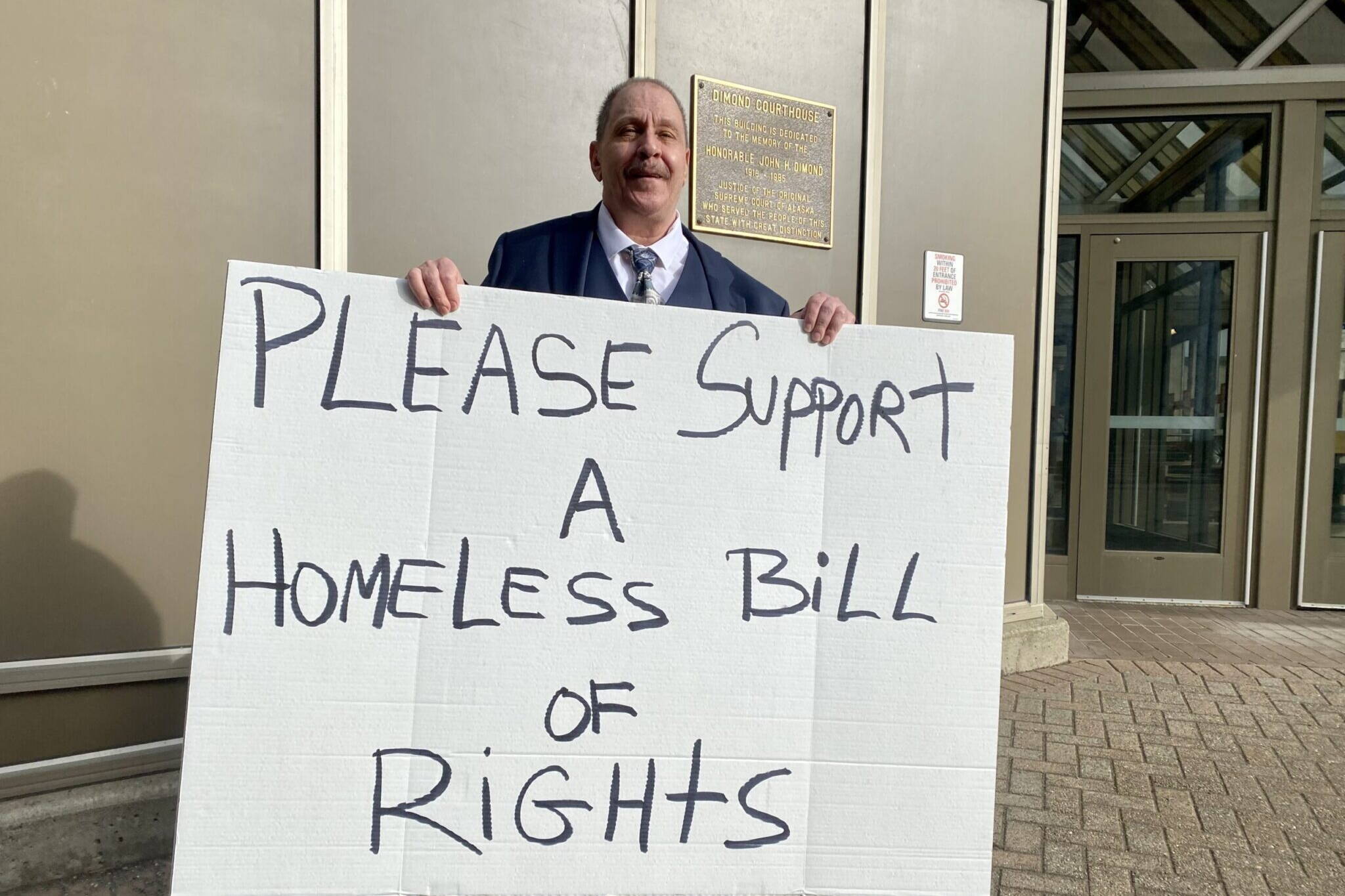TJ Beers stood across the street from the Capitol in a navy suit and held a sign that caught the late afternoon sun on Tuesday. It was printed on a large piece of cardboard, reminiscent of what an unhoused person may sleep on, and said: “A record 51+ homeless residents died on Anchorage streets in the 2023-24 year.” On its reverse was printed: “Please support a homeless bill of rights.”
Beers traveled from Anchorage to Juneau to ask lawmakers to join three other states in codifying the civil and human rights of people experiencing homelessness. He said a bill of rights would keep homeless people safe and be a first step to helping them become housed.
“I want to help the homeless people, I want to push for a homeless bill of rights. Because we need one, the homeless situation in this country is bad and it’s getting worse,” Beers said.
His push comes as those rights are being decided in Alaska and nationally.
Three states — Rhode Island, Connecticut and Illinois — have passed bills that affirm that homeless people have equal rights to housing, medical care, freedom of movement and private property. Lawmakers in California, Hawaii, Oregon, Vermont, Missouri, and Massachusetts have proposed them.
Yet as Alaska grapples with housing its growing homeless population, new measures could move in the opposite direction for people who sleep on the street.
Alaska lawmakers are considering a proposal from Gov. Mike Dunleavy that would further criminalize homelessness. In addition, the U.S. Supreme Court will hear a case at the end of the month that could determine if homeless people may be penalized for sleeping outside when adequate shelter is unavailable.
Beers’ sign is accurate — Anchorage authorities counted 52 people who died outside this last winter. There is no low-barrier shelter in Fairbanks, where hundreds of people are estimated to be homeless and the temperature can drop to minus 40 degrees Fahrenheit. Juneau’s assembly will consider allowing “dispersed camping” this week in the absence of enough shelter. All of Alaska’s major cities have struggled to house or shelter homeless populations that often end up on the street.
More than 3,200 people are estimated to be homeless in Anchorage, a number that far exceeds the city’s ability to house or shelter them. Beers has been homeless there, and slept in Sullivan Arena.
“That was a big nightmare,” he said. “The drugs, the fights, the overdoses. It was a nightmare. You talk about gnashing of teeth! Boy, that was there.”
Beers is now housed through a voucher program in Anchorage. By his count, he was homeless for four years after he was unable to find affordable housing in Maine.
Homeless people are not allowed to sleep where they may block streets, sidewalks or trails. But a new proposal aimed at deterring protests would also further criminalize homelessness. Rather than a simple violation, sleeping outside could be a crime.
If Senate Bill 255 or its companion, House Bill 386, becomes law homeless people will be further limited in where they can stay, Attorney General Treg Taylor said on Wednesday.
“I think that would keep them from putting their tents across sidewalks, roadways, alleyways,” he said. “I think they’d be more limited to parks, those types of places where people aren’t trying to go from point A to point B.”
Taylor explained that the increased penalty would come if a homeless person were asked to move and did not do so.
Senate Judiciary Committee members expressed concern over the bill’s other potential effects this week, suggesting it may have an uphill route to becoming law before the end of the legislative session.
Alaska is not the only state that has restrictions on where homeless people may sleep or sit.
At the end of April, the U.S. Supreme Court is poised to hear arguments in a case from Oregon that will determine if it is cruel and unusual punishment to arrest or ticket people for sleeping outside if they have no other safe place to go. An Alaska civil rights nonprofit joined a brief supporting the plaintiff last week. The outcome could affect whether the proposed law is constitutional.
A safe place to go
Alaska lawmakers are considering upstream methods for addressing homelessness as well. The Senate’s proposed capital budget includes a $6 million appropriation for Housing Alaskans, a public-private partnership.
Sens. Forrest Dunbar and Elvi Gray-Jackson, both Anchorage Democrats, sponsored a resolution that would acknowledge the lack of affordable housing in Alaska and call it “one of the most urgent needs of our state.” Housing advocates and people who manage shelters have said increased affordable housing is the best way to combat homelessness.
Most homeless people don’t get the opportunity for an introduction on the Senate floor, like Beers did this week, when he was a guest of Sen. Löki Tobin, D-Anchorage. It makes Beers a representative of their humanity and dignity on the marbled floors and lushly carpeted halls of the Capitol.
After speaking with lawmakers, he held his signs in the cooling evening in front of the state courthouse across the street. As he told his story, he paused at the moment that he learned that a homeless companion in Maine had died from exposure after Beers left the state. His eyes brimmed with tears.
“If I hadn’t left, maybe he wouldn’t have died,” he said.
He unfolded another cardboard sign. “A warm bed not a cold grave,” it said.
• Claire Stremple is a reporter based in Juneau who got her start in public radio at KHNS in Haines, and then on the health and environment beat at KTOO in Juneau. This article originally appeared online at alaskabeacon.com. Alaska Beacon, an affiliate of States Newsroom, is an independent, nonpartisan news organization focused on connecting Alaskans to their state government.

